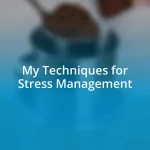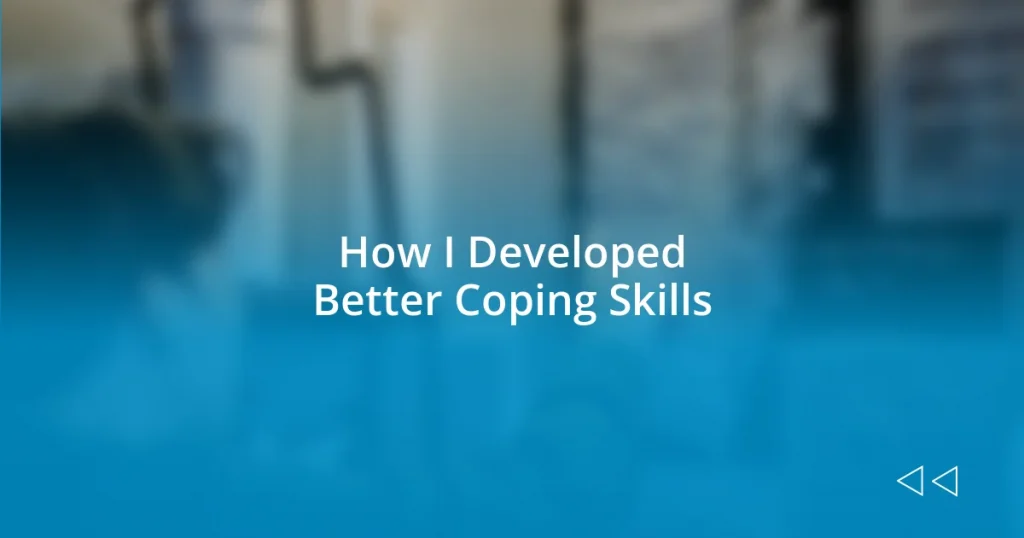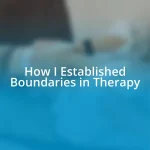Key takeaways:
- Journaling and recognizing physical responses are crucial for identifying personal stress triggers.
- Implementing coping strategies like deep breathing, mindfulness meditation, and physical exercise significantly enhances mental well-being.
- Building a support network and remaining adaptable in coping strategies fosters resilience and sustained progress in managing stress.
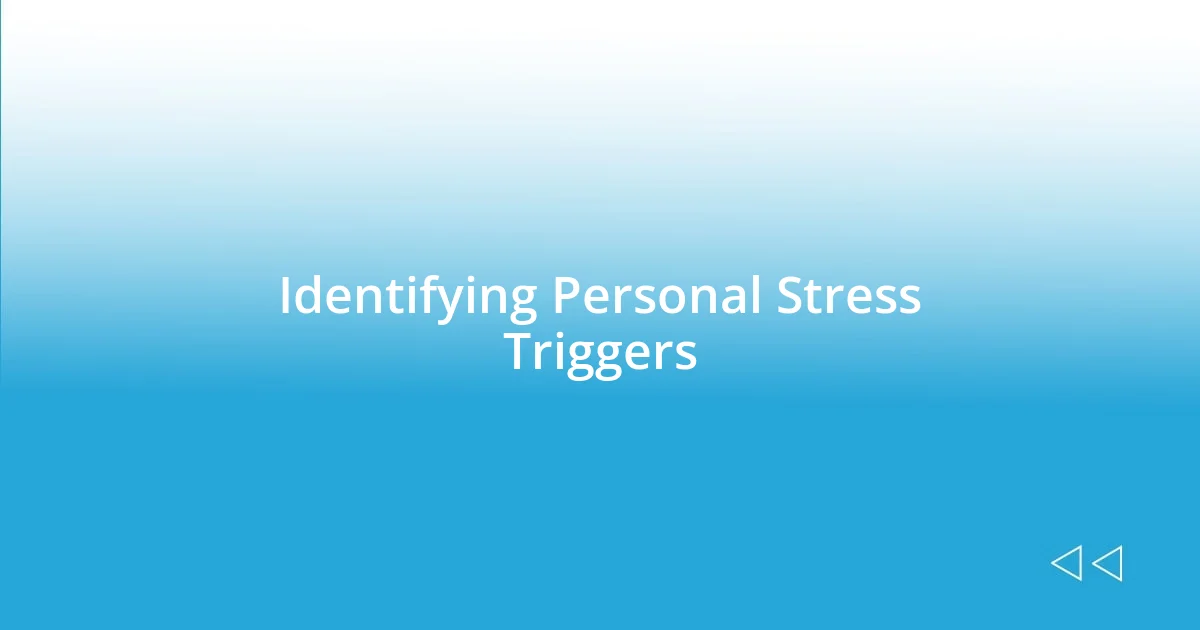
Identifying Personal Stress Triggers
One of the first steps I took in identifying my personal stress triggers was journaling. I would sit down at the end of each day, reflecting on moments that felt overwhelming. It was eye-opening to see patterns emerge—like how crowded places or confrontation could send my anxiety into overdrive. Have you ever noticed how certain situations seem to weigh more heavily on you than others?
Another revelation came during a conversation with a close friend. They pointed out that my mood shifted dramatically whenever I received negative feedback at work. I started paying attention to those moments, realizing they would set off a chain reaction of stress in my personal life as well. It made me wonder: how often do we overlook the specific circumstances that add to our stress?
As I delved deeper into understanding my triggers, I found it essential to pay attention to my physical responses. There were times when my heart would race or I’d feel tightness in my chest without understanding why. Recognizing those bodily signals helped me pinpoint situations that consistently pushed me towards stress. Have you ever stopped to listen to what your body is trying to tell you? By tuning into those signals, I learned to anticipate and manage my reactions more effectively.
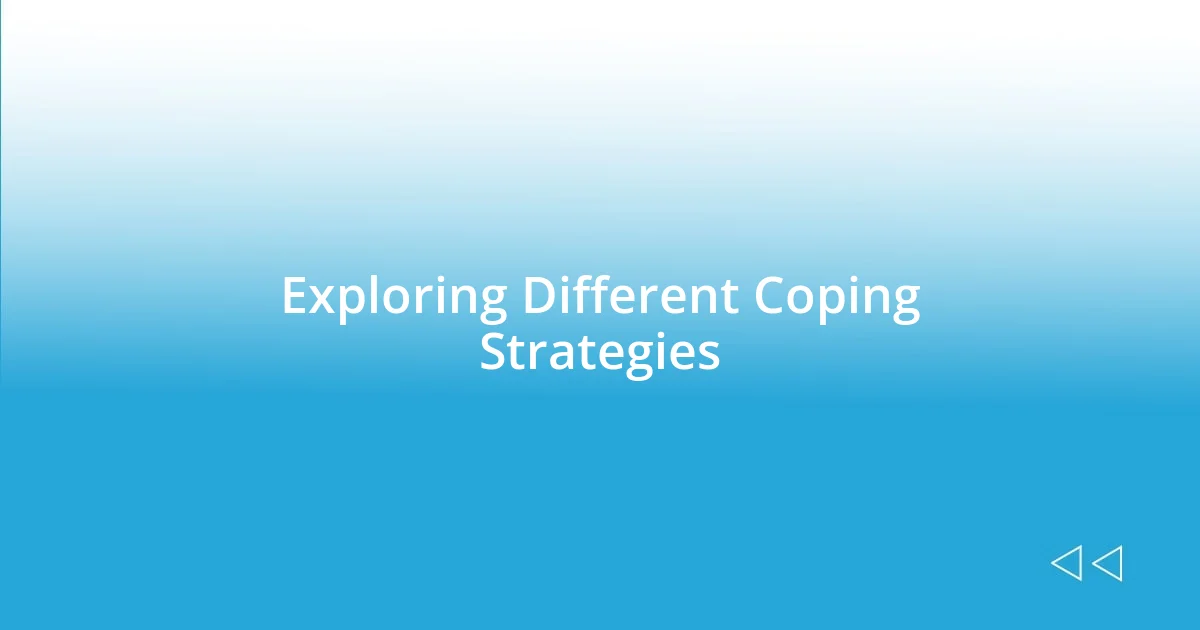
Exploring Different Coping Strategies
Exploring various coping strategies became a pivotal aspect of my journey towards better mental health. For some time, I relied heavily on deep-breathing exercises, which provided an almost immediate sense of calm when stress surged. Taking a few moments to inhale deeply and exhale slowly became my little ritual during chaotic workdays. It was fascinating to see how even a couple of minutes could drastically change my perspective on a stressful situation. Have you ever tried simply breathing through your feelings?
I also ventured into mindfulness meditation, which initially felt awkward but gradually became a comforting escape from my racing thoughts. I remember my first session—my mind was a whirlwind, constantly trying to drift back into stressors I had encountered throughout the day. However, over time, I noticed a shift; instead of resisting my thoughts, I learned to acknowledge them without judgement. This approach cultivated a sense of acceptance, allowing me to ride the waves of stress rather than being engulfed by them.
Another coping strategy I embraced was physical exercise, which turned out to be one of the most rewarding. I discovered that going for a brisk walk or practicing yoga truly helped release built-up tension in my body. There was something liberating about moving my body and feeling the endorphins kick in, significantly lifting my mood. I often wondered: what if more people experienced this transformation? By sharing these different strategies, I hope to inspire others to explore what resonates with them personally.
| Coping Strategy | Key Benefits |
|---|---|
| Deep Breathing | Provides immediate calm and reduces anxiety. |
| Mindfulness Meditation | Promotes acceptance and helps manage racing thoughts. |
| Physical Exercise | Boosts mood through endorphins and releases tension. |
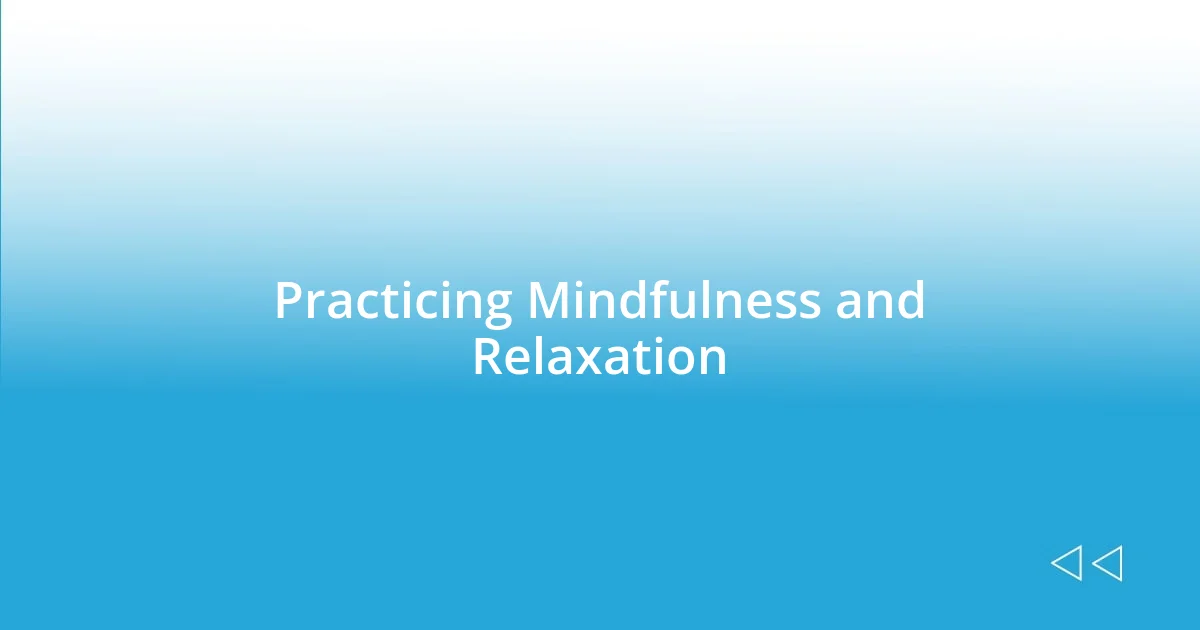
Practicing Mindfulness and Relaxation
Practicing mindfulness and relaxation became a pivotal part of my coping toolkit. I vividly remember my first attempt at a mindfulness session. Sitting silently, my mind was like a runaway train, darting from one worry to the next. Yet, something magical happened when I gently pulled my focus back to my breath. Each inhale felt like inviting calm in, and each exhale released a bit of my anxiety. Have you ever found comfort simply by tuning into your breath, letting the chaos fall away? It’s this simple yet profound practice that gradually transformed my relationship with stress.
- Mindfulness helps ground me in the present moment, allowing me to step back from overwhelming thoughts.
- Relaxation techniques like guided imagery let me escape to peaceful settings, rejuvenating my spirit.
- Integrating regular mindfulness practices brought about a sense of clarity that I didn’t realize I was missing.
- Even short moments of mindfulness during breaks became illuminating, helping me navigate anxious feelings with ease.
Incorporating relaxation practices has been equally transformative. I have a cherished routine of unwinding with calming music after a long day. I’ll settle into my favorite chair, close my eyes, and let the notes wash over me. It’s astonishing how every note seems to melt the tension away, nurturing my soul in those quiet moments. Have you found your own ways to escape into relaxation? The fusion of music and mindfulness created an oasis of peace that permeates every aspect of my life, allowing me to handle challenges with greater grace.
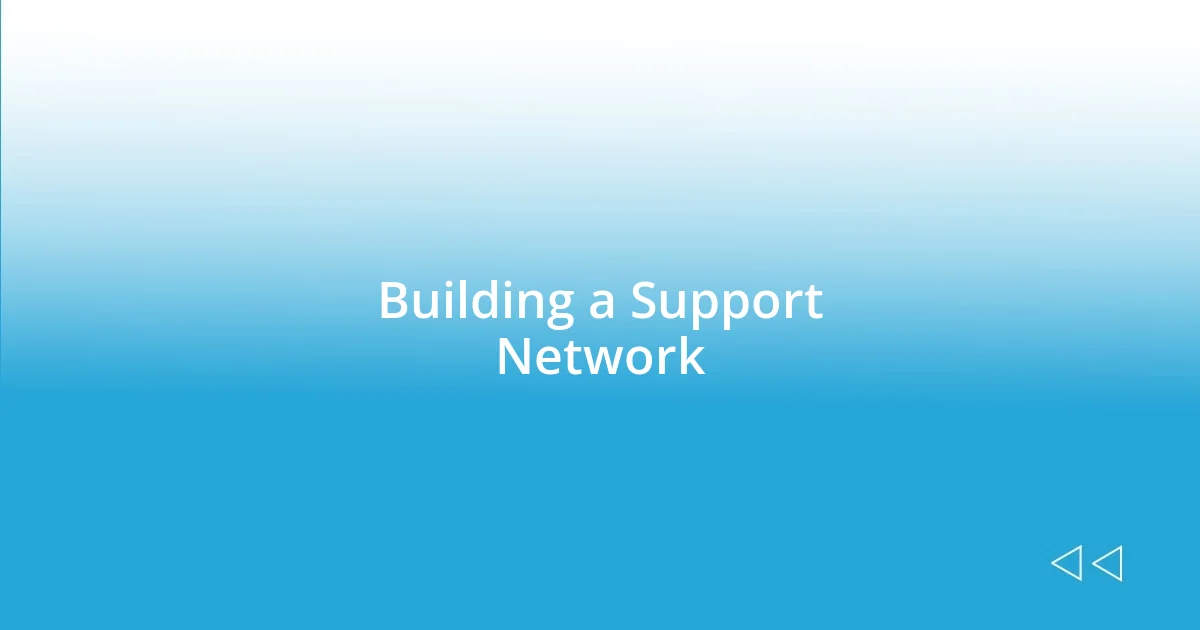
Building a Support Network
Building a support network has been one of the most rewarding aspects of my journey toward better coping skills. I remember reaching out to friends during a particularly tough time; their encouragement felt like a warm blanket on a chilly day. It’s striking how simply sharing your struggles can lighten the emotional load—have you experienced that moment of relief when someone truly listens to your concerns?
As I nurtured those connections, I began to understand that a supportive circle extends beyond just friends. Joining a local support group introduced me to people who faced similar challenges, creating a profound sense of belonging. I recall one evening when we shared our battles and victories; it was uplifting to find solace in shared stories. The power of community is remarkable—what if more individuals embraced this idea of reaching out and connecting?
I’ve come to realize that building a support network also means being present for others. Offering my ear to a friend in distress not only strengthened our bond but also enriched my own coping abilities. It’s fascinating how nurturing such relationships can transform them into mutual support systems. This dynamic has shown me that often, being a source of support can bring its own healing, turning the focus from isolation to connection. In your experience, how impactful have meaningful relationships been in your life?
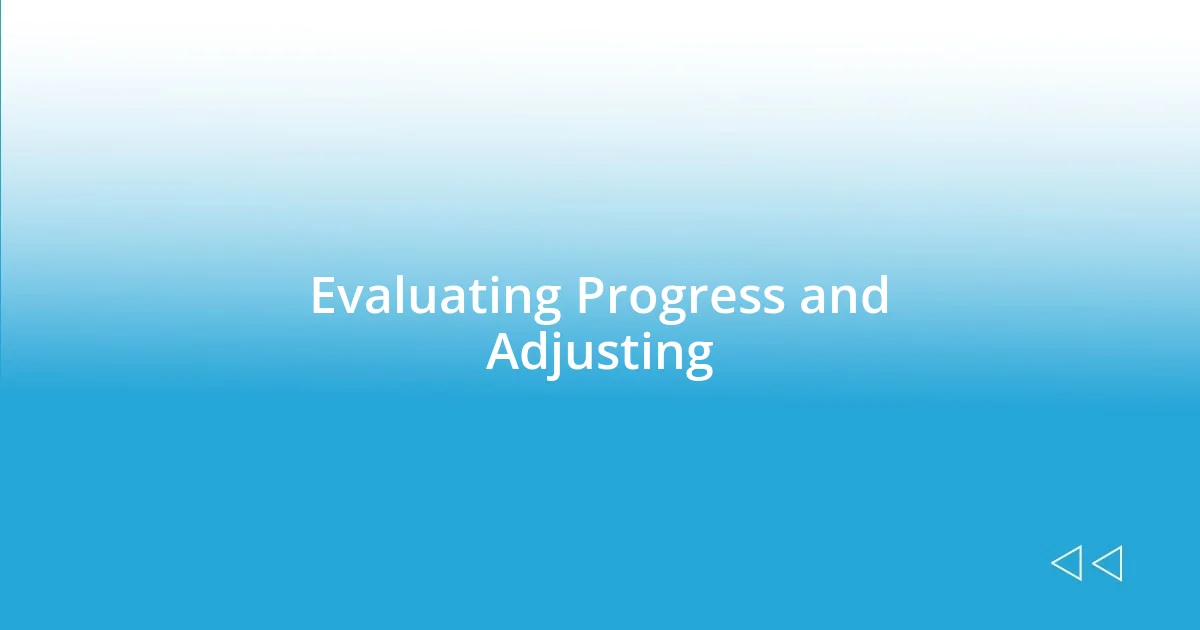
Evaluating Progress and Adjusting
Evaluating my progress in developing better coping skills often feels like gazing into a mirror that reflects my emotional landscape. Each month, I make it a habit to sit down and reflect on my journey—what strategies worked, which ones fell flat, and how I felt during the ups and downs. I remember one period where I thought journaling was a waste of time, but revisiting my entries later revealed just how far I had come. Have you ever noticed that a simple log can serve as both a map and a reminder of your growth?
Adjustments became necessary when some tactics didn’t yield the desired results, like when my initial attempts at meditation seemed frustrating. Instead of giving up, I sought out guided sessions, allowing a gentle voice to lead me through. Because I knew I had to address my unique challenges, tweaking my routine transformed meditation from a source of stress into a soothing escape. Isn’t it amazing how a slight shift can turn frustration into tranquility?
Allowing myself to evolve in real-time makes progress feel organic. I’ve learned to embrace flexibility; for instance, incorporating shorter sessions led to greater consistency in my practice. When life gets busier, I shift to brief mindfulness moments throughout the day, reminding myself that every small effort counts. How often do you find that these little adjustments resonate more deeply than the grand gestures? In many ways, I believe that discovering the right balance is where true growth lies.
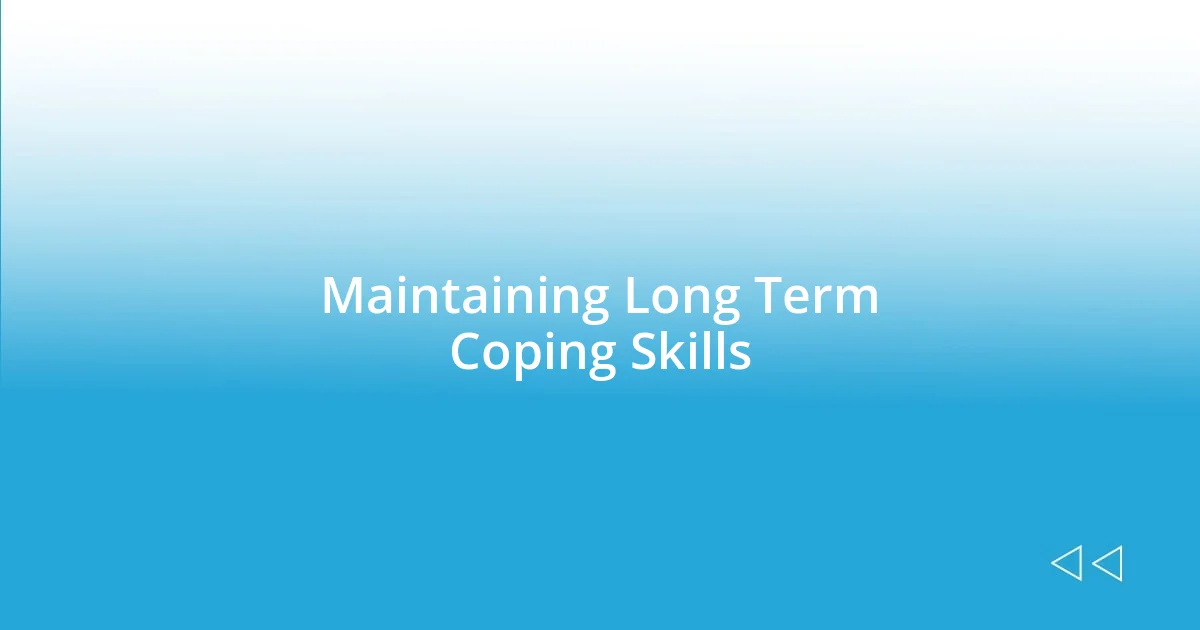
Maintaining Long Term Coping Skills
Maintaining long-term coping skills is a journey that demands regular reflection and commitment. One strategy I’ve found particularly useful is setting aside time each week to assess my mental and emotional state. This practice often opens my eyes to patterns I might otherwise overlook. Have you ever noticed how a dedicated moment of introspection can uncover layers of feelings waiting to be addressed?
Staying adaptable has been crucial in my experience. For instance, there were times when my go-to strategies, like afternoon walks in nature, lost their effectiveness as my life evolved. Instead of clinging to the old routine, I started pairing those walks with podcasts that inspire me. That small shift breathed new life into my coping skills. How often do we realize that reimagining our habits can revive their power?
Another essential aspect is recognizing that it’s okay to seek help when needed. I’ve reached out to professionals during particularly challenging times, and their guidance has illuminated paths I hadn’t considered. I recall one session where a therapist introduced me to cognitive-behavioral techniques that reshaped my thinking about stress. Isn’t it empowering to know that asking for help can be a strength rather than a weakness?









